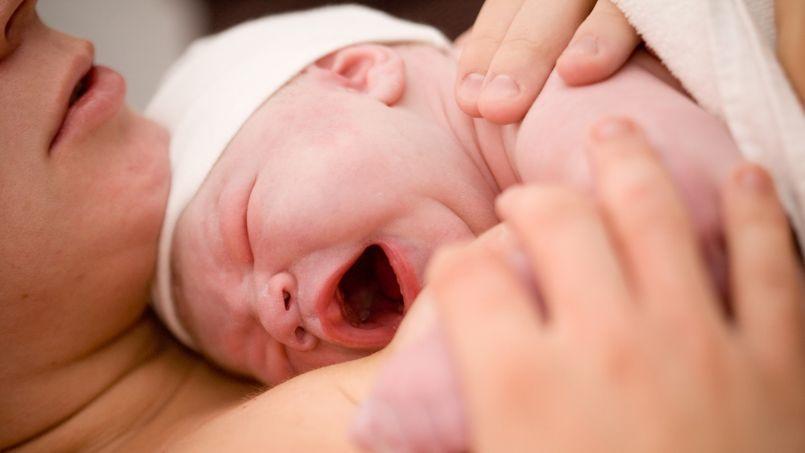In the absence of particular risks, health authorities recommend that Britons give birth at home or in a birth center.
The positioning of the National Institute of Health and Care Excellence (Nice) is surprising, which issues recommendations for good medical practice throughout the English Channel. While developing countries struggle to convince expectant mothers of the benefits of giving birth in a medical setting, one of the most developed countries in the world, on the other hand, has just advise parturients to avoid the hospital when complications are not expected.
According to Nice, the British equivalent of our High Authority for Health, women who have already been mothers at least once and whose birth presents no foreseeable risk, would be interested in giving birth in the presence of a midwife, either in the office of the latter, or at home. “There is scientific evidence that a birth led by a midwife is safer than hospital for a woman who is not at risk of complications. The percentage of interventions, such as the use of forceps or epidural, is lower without the baby's health suffering,” the institute explains on its website, with statistics to support it. “Home births guarantee the same health security as services managed by midwives (structures close to French maternity centers, editor's note)”, he continues, although he advocates maintaining the “freedom of choice” of women.
Excluded from these recommendations are women with a risk profile (over 35 years of age, overweight or obese, hypertension, etc.) and those who could not benefit from a transfer to the hospital by ambulance if they have a problem. For these, the hospital remains the best option.
Pain and finances
The level of risk associated with a home birth, even with the help of a midwife, is a topic of debate. The American College of Obstetricians (ACOG) estimated in 2011 that infant mortality doubled or even tripled in the event of a planned home birth, compared to a hospital. Another American study, published in 2013 in the American Journal of Obstetrics and Gynecology after a study of 13 million births, concluded that the risk was multiplied by 10.
On the other side of the English Channel, reactions to the Nice institute report were immediate. Catherine Bennett, columnist for The Guardian newspaper, He is surprised that “pain, once the association that immediately came to mind when we talked about birth, has barely been mentioned in the debates of recent weeks.” Because outside the hospital there is no epidural. The journalist also warns against the impact of social inequalities on the experience of childbirth itself, ironizing Epinal's image of the mother giving birth in a room dotted with scented candles, with a loving partner at her side. “Not everyone can afford a hot tub (to relieve pain, editor's note) or sometimes even hot water to fill it,” laughs Catherine Bennett.
The Daily Mirror, another newspaper , for its part, questions the economic motivation behind the Nice recommendations. “A home birth costs 1,066 pounds (1,356 euros), compared to 1,450 pounds (1,845 euros) in a birth center and 1,631 pounds (2,076 euros) in the hospital,” she recalls.
The Birth Center Test
In France, the vast majority of births occur in medical settings. “The provision of care may have been too systematic and could be improved,” admits Professor Philippe Deruelle, secretary general of the French National College of Gynecologists and Obstetricians. However, French women “are not prepared for what British women offer,” he believes, highlighting some differences. “Historically, the British have used epidurals much less than the French,” he illustrates.
“What is needed,” recalls Professor Deruelle, “is that, in the event of a complication, we can intervene very quickly. Birthing centers incorporate this restriction, so let's start there. Reorganizing healthcare networks takes time.”
In France, maternity centers are authorized by the law of December 6, 2013, initially on an experimental basis. These non-medicalized structures They are reserved for women with low obstetric and fetal risk during pregnancy and at the time of delivery. Parturients are assisted by midwives who practice privately, in a non-medical, bedroom-like setting. However, each birth center must be attached to a hospital with an obstetrics department, so that the patient who needs emergency surgical care can be quickly transferred to the hospital. A review of the service provided will be carried out after two years of activity.
THE EDITORIAL ADVISES YOU:
Less frequent and better justified cesarean sections
Giving birth in water, a practice not recommended
Birth centers: giving birth the old-fashioned way
A mechanic helps in difficult deliveries

“Troublemaker. Typical travel fan. Food fanatic. Award-winning student. Organizer. Entrepreneur. Bacon specialist.”





:quality(70)/cloudfront-eu-central-1.images.arcpublishing.com/liberation/DJINJFH5SJCBFG6YRP7SCNYGXU.jpg)

